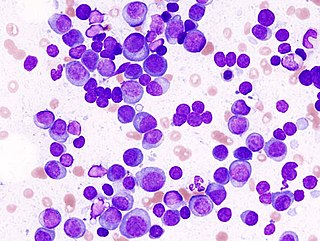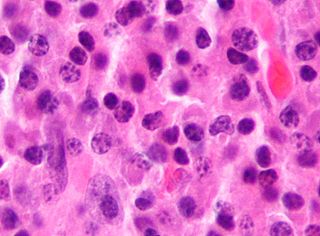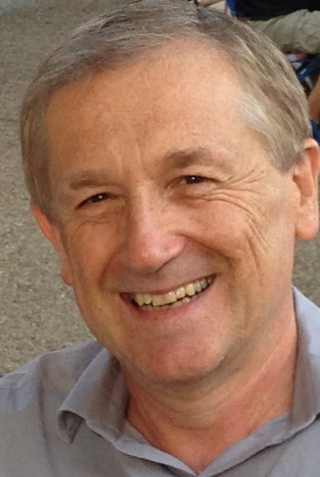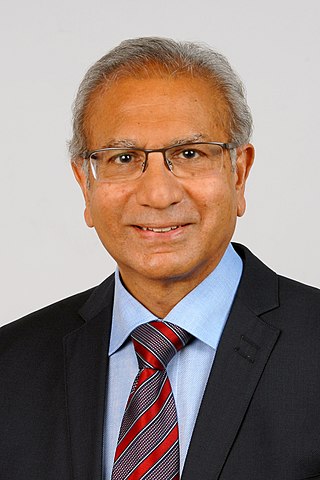Related Research Articles

Multiple myeloma (MM), also known as plasma cell myeloma and simply myeloma, is a cancer of plasma cells, a type of white blood cell that normally produces antibodies. Often, no symptoms are noticed initially. As it progresses, bone pain, anemia, renal insufficiency, and infections may occur. Complications may include hypercalcemia and amyloidosis.

Tumors of the hematopoietic and lymphoid tissues or tumours of the haematopoietic and lymphoid tissues are tumors that affect the blood, bone marrow, lymph, and lymphatic system. Because these tissues are all intimately connected through both the circulatory system and the immune system, a disease affecting one will often affect the others as well, making aplasia, myeloproliferation and lymphoproliferation closely related and often overlapping problems. While uncommon in solid tumors, chromosomal translocations are a common cause of these diseases. This commonly leads to a different approach in diagnosis and treatment of hematological malignancies. Hematological malignancies are malignant neoplasms ("cancer"), and they are generally treated by specialists in hematology and/or oncology. In some centers "hematology/oncology" is a single subspecialty of internal medicine while in others they are considered separate divisions. Not all hematological disorders are malignant ("cancerous"); these other blood conditions may also be managed by a hematologist.

Edward Donnall "Don" Thomas was an American physician, professor emeritus at the University of Washington, and director emeritus of the clinical research division at the Fred Hutchinson Cancer Research Center. In 1990 he shared the Nobel Prize in Physiology or Medicine with Joseph E. Murray for the development of cell and organ transplantation. Thomas and his wife and research partner Dottie Thomas developed bone marrow transplantation as a treatment for leukemia.
Minimal residual disease (MRD), also known as Molecular residual disease, is the name given to small numbers of cancer cells that remain in a person either during or after treatment when the patient is in remission. Sensitive molecular tests are either in development or available to test for MRD. These can measure minute levels of cancer cells in tissue samples, sometimes as low as one cancer cell in a million normal cells, either using DNA, RNA or proteins.

William S. Dalton is an American physician and oncologist, who is board certified in internal medicine and oncology. Since 2002 he has been the President, Chief Executive Officer, and Center Director of the H. Lee Moffitt Cancer Center and Research Institute at the University of South Florida (USF). He served as dean of the University of Arizona College of Medicine, 2001–2002.

Robert Peter Gale is an American physician and medical researcher. He is known for research in leukemia and other bone marrow disorders.
Allen Charles Edward Eaves is the co-founding Director of the Terry Fox Laboratory for Hematology/Oncology Research, which over a 25-year period (1981–2006) he grew into an internationally recognized centre for the study of leukemia and stem cell research. His own research on chronic myelogenous leukemia (CML) has led the way to a new understanding of the disease. As Head of Hematology at the British Columbia Cancer Agency and the University of British Columbia for 18 years (1985–2003) he engineered the building of one of the first and largest bone marrow transplant programs in Canada. In recognition of his research accomplishments and leadership in moving basic science discoveries in stem cell biology into the clinic, he was elected President of the International Society of Cellular Therapy (1995–1997), Treasurer of the Foundation for the Accreditation of Cellular Therapy (1995–2002) and President of the American Society of Blood and Marrow Transplantation (1999–2000). In 2003 he was awarded the prestigious R. M. Taylor Medal by the Canadian Cancer Society and the National Cancer Institute of Canada.
Sir Peter Stanley Harper was a British physician and academic who was University Research Professor (Emeritus) in Human Genetics at Cardiff University. His work focused on researching neurogenetics and has resulted in discoveries concerning muscular dystrophies and Huntington's disease. He was knighted in 2004 for services to medicine.
Kenneth Dawson Bagshawe was a British oncologist, and Emeritus Professor of Medical Oncology, at Charing Cross Hospital.
Martin Bobrow is a British geneticist, and Emeritus Fellow, Wolfson College, Cambridge.
Sylvia Dorothy Lawler was an English geneticist who worked in the field of human genetics.
John M. Goldman was a British haematologist, oncologist and medical researcher. A specialist in chronic myeloid leukaemia, Goldman conducted pioneering research into leukaemia treatment – he was instrumental in the development of bone marrow transplantation as a clinical method, and later in the development of the drug imatinib. He was also a prolific author of scientific papers, was involved with numerous medical charities and had a decades-long surgical career at Hammersmith Hospital, London.

Steven Z. Pavletic is a Croatian-American physician and researcher in hematology and oncology known for his role in developing consensus guidelines for clinical trials in chronic Graft-versus-host disease (GVHD).
Lalit Kumar is an Indian oncologist, known to have contributed to the development of low cost medical facilities in Delhi. The Government of India honoured him, in 2014, with the award of Padma Shri, the fourth highest civilian award, for his contributions to the fields of medicine.
Ashok K. Vaid is an Indian medical oncologist, who specializes in bone marrow transplantation. He is credited with the performance of the first 25 bone marrow transplantations in the private sector in North India. He heads the Cancer Institute- Division of Medical Oncology and Haemotology at Medanta The Medicity.

Surapol Issaragrisil is medical doctor and professor of medicine at Division of Hematology, Department of Medicine, Faculty of Medicine Siriraj Hospital, Mahidol University. He is an expert at hematology, bone marrow transplantation, and blood stem cells transplantation.
David Abraham Goitein Galton (1922-2006) was a British physician, specialising in haematology.
Derek Crowther FRCP, FRCR was a British oncologist who was a professor emeritus at School of Medical Sciences, University of Manchester.

Professor Emeritus Sam H Ahmedzai FRCP, FRCPGlas, FFPMRCoA is a British supportive and palliative care specialist and an Honorary Consultant Physician in Palliative Medicine.
African Caribbean Leukaemia Trust (ACLT) is an independent UK charity for people with leukaemia and other life-threatening disorders. The ACLT aims to raise awareness on stem cell, blood and organ donation in the UK, with a particular focus on black and mixed race communities.
References
- 1 2 3 Daphne Christie; Tilli Tansey, eds. (2003). Leukaemia. Wellcome Witnesses to Contemporary Medicine. History of Modern Biomedicine Research Group. ISBN 978-0-85484-087-8. OL 21078818M. Wikidata Q29581665.
- 1 2 3 Britain, Pride of. "Prof. Ray Powles CBE and Prof. Trevor Powles CBE - Pride of Britain Awards". Pride of Britain . Retrieved 17 June 2017.
- ↑ "Professor Ray Powles". cancercentrelondon.co.uk. Cancer Centre London . Retrieved 17 June 2017.